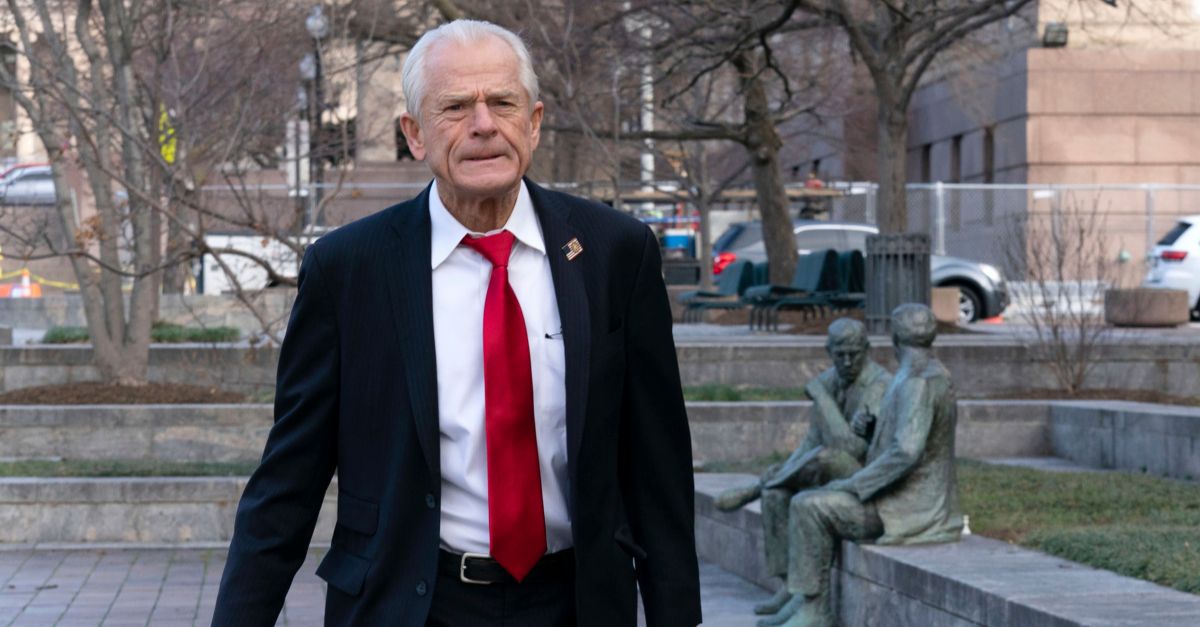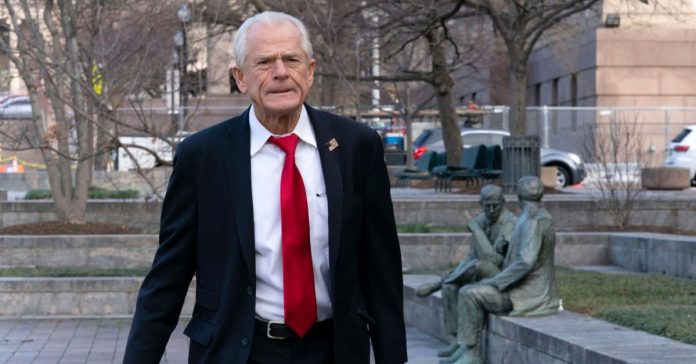
Former Trump White House trade adviser Peter Navarro arrives at the federal courthouse in Washington, Friday, Jan. 27, 2023. (AP Photo/Jose Luis Magana)
For his flouting of a subpoena from a congressional committee investigating the Jan. 6 attack on the U.S. Capitol, Peter Navarro, a self-proclaimed champion of a plan with far-right bloviator and ex-Donald Trump adviser Steve Bannon to contest ballots in the 2020 election, was sentenced to 4 months in prison.
U.S. District Judge Amit Mehta expressed significant doubt that Navarro, 74, ever intended to accept responsibility for his actions despite pleas from defense lawyer Stanley Woodward on Thursday suggesting otherwise.
The “idea that somehow he has exhibited clear demonstration” of his accepting responsibility for his actions was “sort of hard to reconcile” with what Navarro has said about the case historically, Politico first reported Thursday. As recently as last week, Navarro claimed the case against him was a “political prosecution,” according to Washington, D.C., CBS affiliate WUSA.
“I haven’t heard a word of contrition from Dr. Navarro since this case began. Maybe we will hear some today. I suspect not,” Mehta added, according to NBC.
He would not.
Prosecutors for the Justice Department requested the onetime trade adviser to former President Donald Trump serve no less than 6 months in prison, arguing that he “like the rioters at the Capitol, put politics, not country, first, and stonewalled Congress’s investigation.”
Navarro, they said, “chose allegiance to former President Donald Trump over the rule of law.”
Before sentencing, Woodward attempted to advance the argument that a 30-day mandatory minimum for a single count of contempt of Congress did not apply but Mehta rejected that as well.
He was found guilty on two counts of contempt of Congress in September after just a daylong trial and four hours of deliberations. Navarro’s attorneys sought probation only. The minimum sentence for each count is one month and the maximum is a year. The Justice Department sought a fine of at least $200,000. Ultimately, Mehta fined Navarro $9,500.
Seemingly, it was an open-and-shut case for jurors: Prosecutors had argued that the House Select Committee to Investigate the Jan. 6 Attack on the U.S. Capitol believed Navarro had key information relevant to the fully authorized probe on the events leading up to, on and after the attack. Among other subjects, the committee wished to question Navarro about the credit he had taken publicly for devising a plan with ex-Trump adviser Steve Bannon known as “The Green Bay Sweep.”
In the fallout of Jan. 6, Navarro had insisted the aim of the “sweep” wasn’t to overturn the 2020 election outright but rather, to contest results in no less than a half-dozen states won by now President Joe Biden.
This would be done, however, by promoting what was ultimately baseless and now long-debunked conspiracy theories of widespread voter fraud. Notably, it was Navarro’s release of a “report” on so-called voter fraud that Trump clung to in a now notorious Dec. 19, 2020, tweet claiming his adviser found proof “‘more than sufficient’ to swing victory to Trump.”
“Statistically impossible to have lost the 2020 election. Big protest in D.C. on January 6th. Be there, will be wild,” Trump added.
When Navarro was asked for records by Congress, he did not comply voluntarily and when facing the threat of subpoena, he did not comply. When finally under subpoena, he also failed to comply.
He claimed executive privilege, telling investigators and the courts alike he was unable to respond to a request from Congress because Trump had invoked it over him and his testimony, pretrial.
But there was no proof that privilege was ever invoked — none that Judge Mehta or the jury could see. Even Trump left Navarro out to dry in the end: the former president never provided him with any evidence to support his defense. President Joe Biden, notably, also declined to retroactively invoke the privilege for Navarro.
Navarro’s bid for a new trial was denied earlier this month; in sum, his attorney Stanley Woodward argued that jurors were inappropriately approached or exposed to protesters and members of the press, unduly influencing the verdict. But Mehta disagreed after reviewing footage shot from outside the federal courthouse.
“The record establishes that in addition to members of the media there were three men with signs in John Marshall Park when the jurors were on their break. Of the three men, two were filming and a third was not. None of them, nor anyone else, approached the jurors or directed any words toward them. None of them pointed their signs toward jurors. In fact, the two men filming did not seem to recognize the group as jurors in the defendant’s case,” Mehta wrote in a 15-page decision.
Woodward did not put any witnesses forward at trial either. He largely argued that it was not an intentional evasion of a subpoena but accidental. Navarro filed his notice to appeal shortly after his sentencing was completee, according to court records obtained by Law&Crime. In court briefs filed earlier this week, he made claims of executive privilege once again.
Before Navarro, Steve Bannon was convicted of contempt of Congress in July 2022 and then later sentenced to four months. He appealed and remains out of detention in the meantime.
The duo were not the only members of Trump’s higher-ups that were referred for prosecution by the special committee. They also referred Mark Meadows, Trump’s one-time chief of staff, and his communications aide Dan Scavino but federal prosecutors did not pursue action. Unlike Navarro and Bannon, as Mehta noted last year, they had received letters from Trump ordering them not to testify.
As The Washington Post noted Thursday, Mehta told Navarro’s legal team directly: “Had the President issued a similar letter to Defendant, the record here would look very different.”
Meanwhile, assistant U.S. Attorney John Crabb Jr. told the court Thursday: “This prosecution is not a product of politics. This is a righteous prosecution.”
It was handled by “career public servants,” he said.
“The defendant believes he is above the law but no one is above the law. We are a nation of laws. The rule of law is crucial to a functioning democracy,” Crabb said.
As Woodward pushed back against this and suggested it was not possible to know whether “politics” were involved in the charges against Navarro or not, Mehta aired frustration.
“You know what bothers me about his public statements?” Mehta said. “It’s unfortunate that his statements mislead. Nancy Pelosi’s not responsible for your prosecution. Joe Biden is not responsible for your prosecution.”
According to Politico, the judge added: “It’s those kind of statements from somebody who knows better… that contributes to why our politics are so corrosive.”
“This was a significant effort by Congress to get to the bottom of a terrible day in American history,” the judge said later.
Initially, Navarro’s attorney said his client would not make a statement before sentencing but admittedly against the advice of his counsel, Navarro did address the court.
“When I received that congressional subpoena… I had an honest belief the privilege had been invoked,” Navarro said, according to CBS, before also adding that “nobody in my position should be put in conflict between the legislative branch and the executive branch.”
He also addressed the judge’s commentary earlier in proceedings Thursday when Mehta said if Navarro had only consulted an attorney “worth his salt” who would have offered the sound advice that blowing off the committee altogether was a mistake, he “wouldn’t be standing here today.”
“Your comment, sir, that I should have got a lawyer or I wouldn’t be here. Is that the lesson of this entire proceeding?” Navarro retorted. “I’m a Harvard-educated gentleman, but the learning curve when they come at you with the biggest law firm in the world is very, very steep.”
Navarro also said “the minute that violence erupted” on Jan. 6, it became “one of the worst days of my life.” He also vowed, CBS reported, that “if the lesson of this case is to get a lawyer when you’re subpoenaed then there’s no reason for this harsh punishment.”
“The lesson is learned,” he said.
Mehta seemed unpersuaded by this and other suggestions from Navarro that there existed a “two-tiered system of justice” for him as he appeared in court with “four lawyers at this table who are extremely competent.”
Calling it “a real head-scratcher” of a remark, Mehta continued: “There is, some would say, a two-tiered system of justice. This is not it.”
The Obama-appointed judge also reiterated that there was zero evidence, despite multiple requests for it, that Trump “ever uttered the words ‘executive privilege”” to him or told Navarro to assert it.
“You are not a victim,” Mehta said.
Simply invoking executive privilege with proof is not sufficient, he added, telling him: “The words ‘executive privilege’ are not magical dust… it’s not a get out of jail free card.”
An important detail noted in the legal and civil rights blog emptywheel on Thursday: Despite the conclusion of this part of his contempt saga, there remains a lawsuit against Navarro that seeks submission of his communications on ProtonMail relevant to the events of Jan. 6 and his alleged role in them.
A briefing will be scheduled in the coming days to discuss whether the ruling will be stayed pending appeal.
Have a tip we should know? [email protected]

